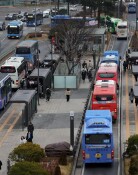Unless Major Modifications are Carried Out, National Pensions Will Hit Bottom in 2046
Unless Major Modifications are Carried Out, National Pensions Will Hit Bottom in 2046
Posted February. 15, 2004 22:55,
Without an overall reform in the pension system (including national pensions and public servant pensions) in its early stages, a serious crisis in the system is expected to take placeits funding will hit bottom and the deficit will continue to increase to uncontrollable levels.
The Korea Development Institute (KDI) warned yesterday in its report, titled Economic Effect of Ageing Population and Challenges that Korean society, currently experiencing condensed ageing, will lack the time to prepare for a new aging era.
Pension finance is very much like a time bomb. If the current national pension system continues without fundamental modification, the current total of funds, which has topped 110 trillion won, is expected to reach zero won by the year of 2046, the report said.
Besides, if the current allowance ratio, 60 percent of lifetime average incomes, goes without change, the pension fund would be in the red by 2058 and dry up completely by 2079 even if the premiums of pensions increase from the current nine percent of incomes to 18 percent.
Furthermore, even though public servant pensions whose deficit marked as much as 2.7 trillion won in 1999, have managed to meet the balance, the increasing retirement rate of public servants is expected to widen the deficit further.
National health insurance, thanks to the increasing number of older people who spend a lot in health care, is expected to suffer from snowballing expenditure as wellwhich is projected to reach 27 trillion won in 2010, 56 trillion won in 2020, and 106 trillion won in 2030.
The KDI estimated that, in order to meet the balance, the current ratio, 3.95 percent (medical care insurance in workplace) should go up to eight percent.
The report, citing materials produced by the Korea Institute for Social Insurance, revealed that potential deficits of public pensions including the national pension, the public servant pension, the teachers pension, and the military pension are estimated to reach 340 trillion won as of 2002.
This is the aftermath of condensed aging. Experts attribute the current situationKorea, whose national incomes still hovers at about 10,000 dollars, shows problems, which occur in advanced countriesto speedy aging trends in Korea that outrun any other countrys in the world. This is, they point out, mainly caused by the decline of fertility in Korea.
Korea entered the aging society in 2000 with the proportion of its people aged 65 years or over reaching seven percent of the total population. If this pace continues, by 2019, Korea is expected to step across the threshold of aged society, with its proportion reaching 14 percent. If it really takes place, Korea can break a record made by Japan (24 years) by shortening five years.
How can we deal with this? The report suggests that without overall reform of the current pension system trademarked by low payment-high allowance, we cannot prevent the pension fund from drying out, especially when a declining fertility rate brings about a shrinking labor force, and aging trends causes the swelling allowance of the pension.
However, it is not easy to carry out such a great deal of reform. In fact, the government introduced a revision bill on National Pension Law last year, through which people pay more and receive less. However, the bill was not passed in National Assembly due to the objection of lawmakers who were concerned about the upcoming general election.
European countries, who are experiencing aging trends ahead of Korea as well, failed to perform successful institutional reforms in their pension systems. In recent years, therefore, they are making all-out efforts to tackle the problem after facing a serious lack of pension funds.
The speedy ageing will bring about enormous expenditure in supporting social security. Even though aging is the matter of the future, prolonged initiative on institutional reform will cause not only deteriorating finances of pensions, but will also conflict between generations over justices of distribution, the report suggested. It recommended that overall institutional reforms in the pension system, after winning national consensus, should be launched as soon as possible.
Jong sik Kong Chi-Young Shin kong@donga.com higgledy@donga.com







